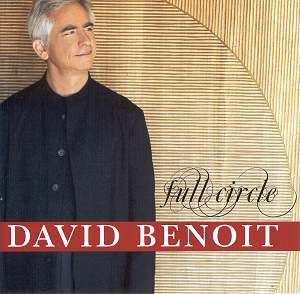Cafe Rio (Benoit) [4:18]
First Day of School (Benoit, Brown) [4:08]
Water to Drink (Agua de Beber) (Antonio Carlos
Jobim, Vinicius De Moraes)[3:57]
Beat Street (Benoit, Lorber)[4:15]
Six P.M. (Benoit) [4:39]
Chasing the Tides (Benoit, Brown)[4:52]
Neat with a Twist (Benoit, Lorber)[5:16]
Katrina’s Little Bear (Benoit) [3:47]
Yusuke the Ghost (Benoit) [3:36]
Monster in the Attic (Benoit) [4:36]
Collective personnel: David Benoit (piano,
keyboards, Fender Rhodes, synthesizers, Hammond
B3), Jerry Hey, Ron King, Rick Braun (trumpet),
Bill Reichenbach (trombone), Dan Higgins (sax,
flute), Andy Suzuki (tenor sax), Eugene Groove,
Gary Meek (sax), Tim Weisberg (flute), Oscar
Castro-Neves, Paul Brown, Pat Kelley, Dwight
Sills, Paul Jackson Jr. (guitar), Roberto
Vally, Nathan East, Alex Al, Brian Bromberg
(bass), Timothy Laundauer (cello), John Robinson,
Michael White (drums), Jeff Lorber (drums
programming), Luis Conte, Alex Acuna (percussion)
No recording date given – 2005(?)
David Benoit has led a musical
life of quite extraordinary variety. As a
conductor he has presented works by, amongst
others, Bernstein, Copland, Stravinsky and
Saint-Saens. He has worked with orchestras
such as The Los Angeles Philharmonic, The
Atlanta Symphony and The Dresden Philharmonic.
As a pianist he has performed a number of
Claude Bolling’s jazz-influenced suites –
such as the Suite For Flute and Jazz Piano
and the Suite for Cello and Piano. His compositions
include The Peanuts Piano Concerto, written
in tribute to Charles Schulz; he has written
several film scores; he has worked as a musical
director/arranger/conductor with many artists,
including Patti Austin, Kenny Rankin and David
Sanborn.
This present CD seems to
mark Benoit’s return to the territory often
described as ‘smooth jazz’. The resultant
music is highly competent, played by top-class
musicians. It is also oddly characterless.
The most interesting tracks are the ones which
make most extensive use of Latin rhythms –
such as the opener ‘Café Rio’, a jaunty
piece with some engaging phrases and patterns;
but even here one finds oneself waiting for
something which will actually escape from
the prevailing patterns, something that will
bite, something that will demand more committed
attention from the listener. More often than
not the track fades out before it happens
– though there are exceptions, as in the trumpet
and tenor playing of Rick Braun and Andy Suzuki
on ‘Six P.M.’
Whitney Balliett famously
described jazz as "the sound of surprise".
There are, I’m afraid, too few surprises here.
There are pleasant melodic runs, there is
some impressive, well-honed work from a variety
of rhythm sections, but too much of it lacks
that affirmation of the individual sensibility
which is one of the hallmarks of the very
best jazz, in whatever stylistic idiom.
This would doubtless make
excellent background music at the right kind
of ‘sophisticated’ social gathering. But all
the musical surfaces are so well polished,
so cleansed of irritants and dirt, that when
I try to listen to it attentively I find that
my mind keeps being reflected elsewhere, that
so high gloss is the finish that the music
slips through my grasp.
If ‘smooth jazz’ is a genre
that appeals to you, you will doubtless find
much to enjoy here. For my own tastes, a couple
of listenings to this CD, so highly competent,
made me long for some of the roughness, some
of the risks (even some of the ‘errors’) of,
say, Charlie Parker or Bud Powell, Henry Red
Allen or Lester Bowie.
Glyn Pursglove
